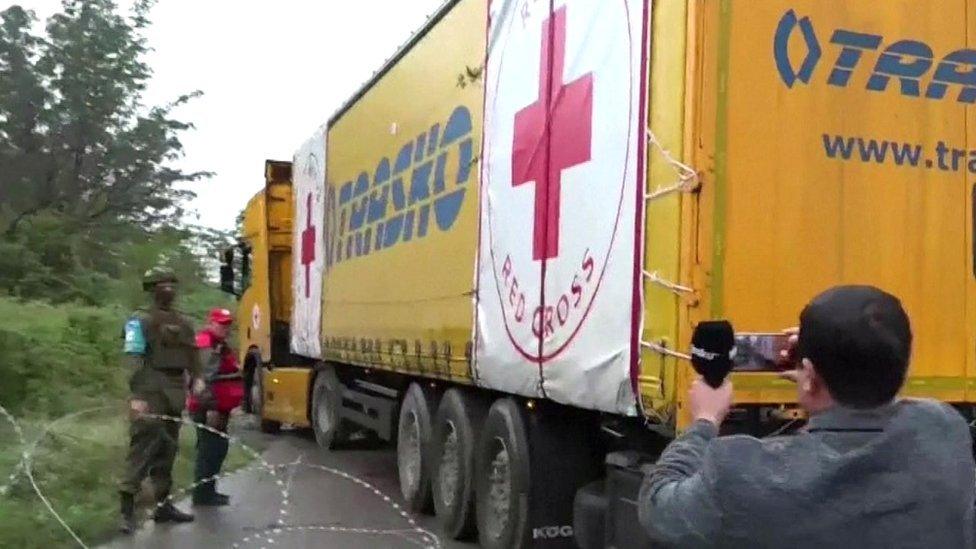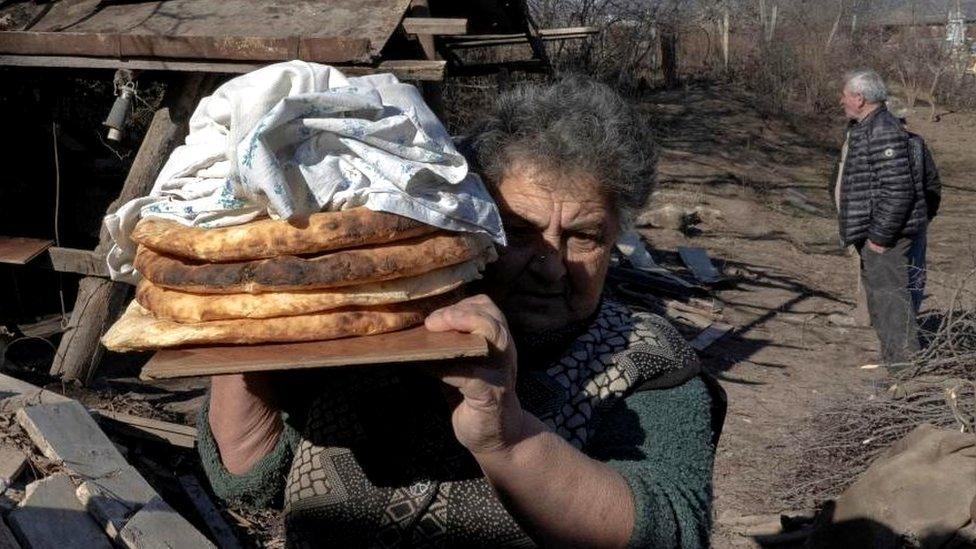Russian aid reaches beleaguered enclave of Nagorno-Karabakh
- Published

The Russian Red Cross lorry went through an Azerbaijani checkpoint early on Tuesday
Nine months into Azerbaijan's effective blockade of a road linking its breakaway region of Nagorno-Karabakh to Armenia, a Russian truck has arrived in the enclave carrying humanitarian aid.
The aid did not travel through the single route linking it to Armenia, blocked since December, but via a road in Azerbaijan.
Nagorno-Karabakh's 120,000 citizens have faced severe shortages for months.
However, some residents initially tried to stop the aid getting through.
Armenian reports said they eventually allowed the consignment of food and toiletries through on condition that Azerbaijan would re-open the so-called Lachin Corridor route into Armenia.
Azerbaijan said it had agreed to the "simultaneous use" , externalof the two routes through the International Committee of the Red Cross.
For months, residents have complained of bread queues and empty shelves in shops because of shortages of medicines and basic toiletries, after Azerbaijan blocked the Lachin Corridor, accusing Armenia of using it to smuggle weapons.
The two South Caucasus states have fought two wars since the break-up of the Soviet Union in the 1990s.
Karabakh is inside Azerbaijan's recognised borders but has been under Armenian control since 1994. After the most recent war in 2020, all the territory surrounding the enclave was recaptured by Azerbaijani forces.
That has made security for ethnic Armenians there increasingly precarious.
Three thousand Russian peacekeepers were deployed to guarantee their safety but last week Armenian Prime Minister Nikol Pashinyan complained that Russia was either "does not want or cannot have control" of the Lachin Corridor.
"We are seeing that Russia is spontaneously leaving the region, and we don't know why," he told La Repubblica newspaper.
Pointing to Russia's war in Ukraine, he said Russia needed weapons for itself and Armenia's reliance on a single source for security was a "strategic error".
Armenia then announced it was hosting joint exercises this week with US forces which were criticised by Moscow as "unfriendly steps". Russia still maintains a permanent military base in Armenia.
A picture of Mr Pashinyan's wife shaking hands with Ukraine's president, Volodymyr Zelensky, in Kyiv last week added to the tensions. Anna Hakobyan's visit to deliver humanitarian aid and meet the local Armenian community was seen as an outward display of support for a country facing a full-scale Russian war.
Armenia remains a member of Russia's military alliance - the Collective Security Treaty Organisation - but Mr Pashinyan said earlier this year that if the CSTO pulled out of his country, he could not rule out freezing its membership of the alliance.
President Vladimir Putin denied that Armenia had broken off its alliance with Russia, but declared on Tuesday that Yerevan had "essentially recognised" Azerbaijan's sovereignty over the enclave.
"If Armenia itself recognised that Karabakh is part of Azerbaijan, what should we do?" he said during an economic forum in Vladivostok.
"I hope that the Azerbaijani leadership, as they told us earlier and tell us now, is not interested in any kind of ethnic cleansing."


Related topics
- Published30 August 2023
